Notebook relating to the service of Major Charles Patrick Tracey, 1942-1944 - Part 4
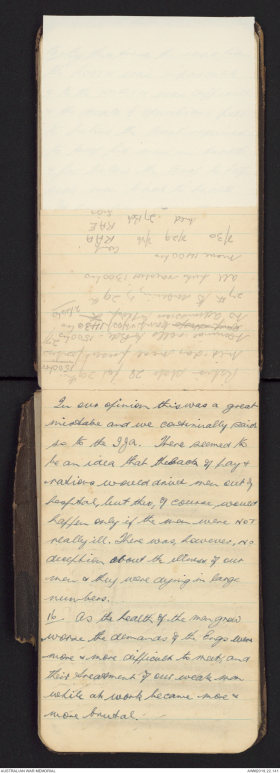
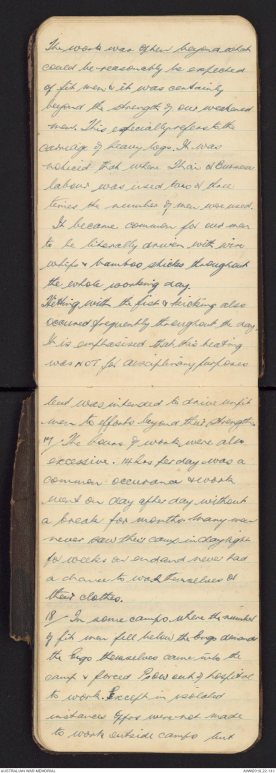
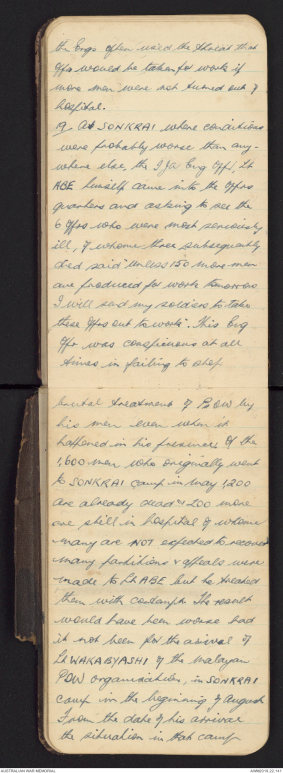
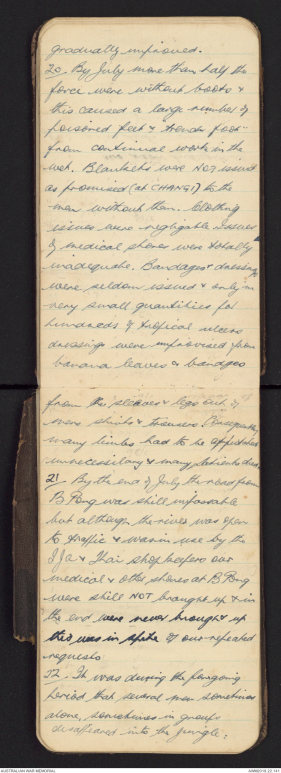
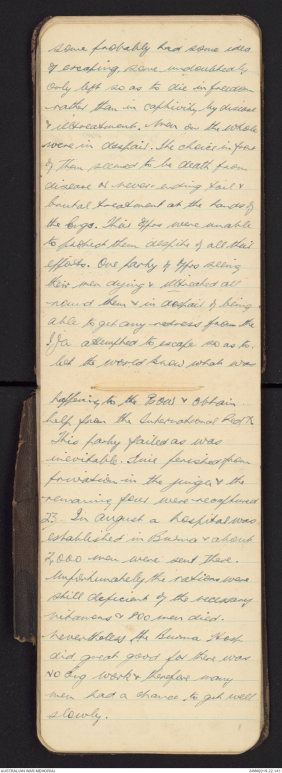
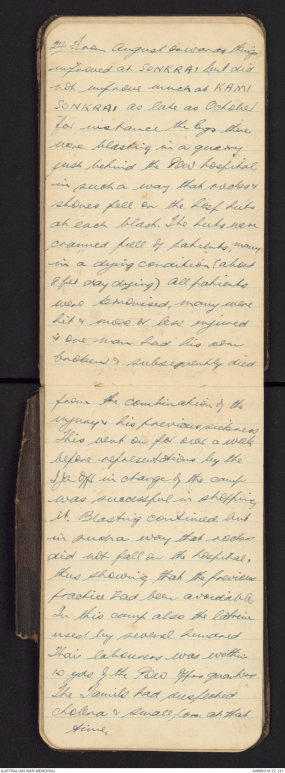
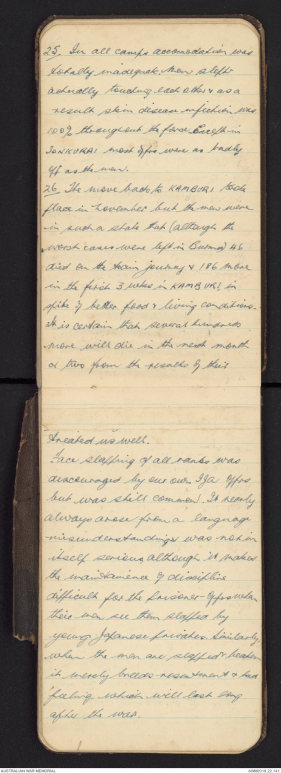
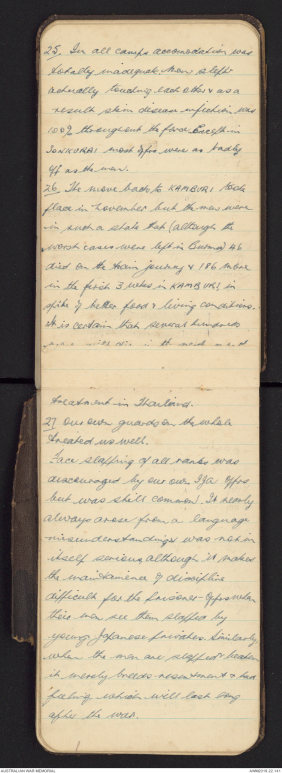
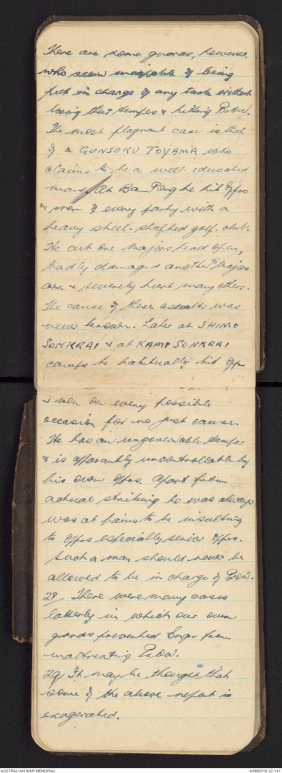
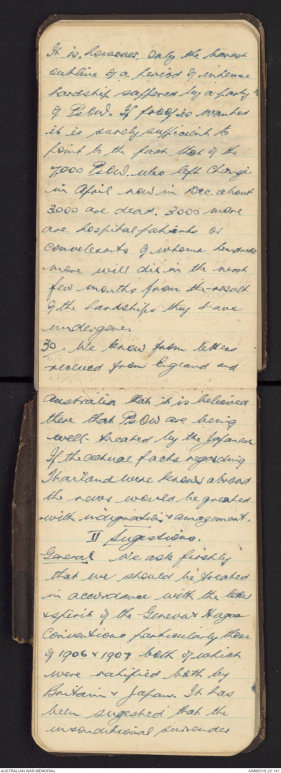
Ration state 28 for 29th
1500 hrs
Mid-day meal present position
Nominal rolls to Bde - 1500 hrs 27/
xxxxxxxxxxx Camp & Hosp 1430 hrs
No Admissions at Hosp H 2 lists
27th to morning of 29th
All huts vacated 1300 hrs
Move 1400 hrs
2/30 2/29 2/56 Camp
RAA
RAE
med 27 Bde Sigs
-------------------------------------------------
In our opinion this was a great
mistake and we continually said
so to the IJA. There seemed to
be an idea that the lack of pay &
rations would drive men out of
hospital, but this, of course would
happen only if the men were NOT
really ill. There was, however, NO
deception about the illness of our
men & they were dying in large
numbers.
16 As the health of the men grew
worse the demands of the Engs were
more & more difficult to meet, and
this treatment of our weak men
while at work became more &
more brutal.
The work was often beyond what
could be reasonably be expected
of fit men & it was certainly
beyond the strength of our weakened
men. This especially refers to the
carriage of heavy logs. It was
noticed that when Thai or Burmese
labour was used two or three
times the number of men were used.
It became common for our men
to be literally driven with wire
whips & bamboo sticks throughout
the whole working day.
Hitting with the fist & kicking also
occurred frequently throughout the day.
It is emphasised that this beating
was NOT for disciplinary purposes
but was intended to drive unfit
men to efforts beyond their strength
17 The hours of work were also
excessive. 14 hrs per day was a
common occurance & work
went on day after day without
a break for months. Many men
never saw their camp in daylight
for weeks on end and never had
a chance to wash themselves or
their clothes.
18 In some camps where the number
of fit men fell below the Engs demands
the Engs themselves came into the
camp & forced P.OW out of hospital
to work. Except in isolated
instances Offs were not made
to work outside camps but
the Engs often used the threat that
Offs would be taken for work if
more men were not turned out of
hospital.
19 At SONKRAI where conditions
were probably worse than any-
where else, the IJA Eng Offr, Lt
ABE himself came into the Offrs
quarters and asking to see the
6 Offrs who were most seriously
ill, of whom three subsequently
died said 'unless 150 more men
are produced for work tomorrow
I will send my soldiers to take
three Offrs out to work'. This Eng
Offr was conspicuous at all
times in failing to stop
brutal treatment of PsOW by
his men even when it
happened in his presence. Of the
1,600 men who originally went
to SONKRAI camp in May 1,200
are already dead & 100 more
are still in hospital of whom
many are NOT expected to recover
many partitions & appeals were
made to Lt ABE but he treated.
them with contempt. The result
would have been worse had
it not been for the arrival of
Lt WAKABYASKI of the Malayan
PsOW organisation, in SONKRAI
camp in the beginning of August.
From the date of his arrival
the situation in that camp
gradually improved.
20 By July more than half the
force were without boots &
this caused a large number of
poisoned feet & trench foot
from continual work in the
wet. Blankets were NOT issued
as promised (at CHANGI) to the
men without them. Clothing
issues were negligable. Issues
of medical stores were totally
inadequate. Bandages & dressings
were seldom issued & only in
very small quantities for
hundreds of tropical ulcers
dressings were improvised from
banana leaves & bandges
from the sleeves & legs out of
more shirts & trousers. Consequently
many limbs had to be amputated
unnecessilary & many patients died.
21 By the end of July the road from
B Pong was still impassable
but although the river was open
to traffic & was in use by the
IJA & Thai shopkeepers our
medical & other stores at B Pong
were still NOT brought up & in
the end were never brought up
this was in spite of our repeated
requests
22 It was during the foraging
period that several men sometimes
alone, sometimes in groups
disappeared into the jungle.
Some probably had some idea
of escaping, some undoubtedly
only left so as to die in freedom
rather than in captivity by disease
& illtreatment. Men on the whole
were in despair. The choice in frontt
of them seemed to be death from
disease or never-ending toil &
brutal treatment at the hands of
the Engs. Their Offrs were unable
to protect them despite of all their
efforts. Our party & Offrs seeing
their men dying & illtreated all
round them & in despair of being
able to get any redress from the
IJA attempted to escape so as to
let the world know what was
happening to the PsOW & obtain
help from the International Red X
This party failed as was
inevitable. Five perished from
privation in the jungle & the
remaining four were recaptured
23 In August a hospital was
established in Burma & about
2,000 men were sent there.
Unfortunately the rations were
still deficient of the necessary
vitamins & 800 men died.
Nevertheless the Burma Hosp
did great good for there was
NO Eng work & therefore many
men had a chance to get well
slowly.
24 From August onwards things
improved at SONKRAI but did
not improve much at KAMI
SONKRAI as late as October
for instance the Engs there
were blasting in a quarry
just behind the POW hospital
in such a way that rocks &
stones fell on the hosp huts
at each blast. The huts were
crammed full of patients, many
in a dying condition (about
8 per day dying) All patients
were demonised, many were
hit & more or less injured
& one man had his arm
broken & subsequently died
from the combination of the
injury & his previous sickness
This went on for over a week
before representation by the
IJA Offr in charge of the camp
was successful in stopping
it. Blasting continued but
in such a way that rocks
did not fall on the hospital.
thus showing that the previous
practice had been avoidable.
In this camp also the latrine
used by several hundred
Thai labourers was within
10 yds of the POW Offrs quarters
The Tamils had suspected
cholera & smallpox at that
time.
25 In all camps accommodation was
totally inadequate. Men slept
actually touching each other & as a
result skin disease infection was
100% throughout the force. Except in
SONKURAI most Offrs were as badly
off as the men.
26 The move back to KAMBURI took
place in November but the men were
in such a state that (although the
worst cases were left in Burma) 46
died on the train journey & 186 more
in the finish 3 wks in KAMBURI in
spite of better food & living conditions.
It is certain that several hundreds
more will die in the next month
or two from the results of their
treated as well.
Face slapping of all ranks was
discouraged by our own IJA Offrs
but was still common. It nearly
always arose from a language
misunderstanding & was not in
itself serious although it makes
the maintenance of discipline
difficult for the Prisoner-Offrs when
their men see them slapped by
young Japanese privates. Similarly,
when the men are slapped & beaten
it merely brews resentment & bad
feeling which will last long
after the war.
There are some guards, however,
who seem incapable of being
put in charge of any task without
losing their temper & hitting PsOW
the most flagrant case is that
of a GUNSOKU TOYAMA who
claims to be a well educated
man. At BanPong he hit Offrs
or men of every party with a
heavy steel-shafted golf-club.
He cut the Majors head open,
badly damaged another Majors
arm & severely hurt many others.
The cause of their assaults was
never known. Later at SHIMO
SONKRAI & at KAMP SONKRAI
camps he habitually hit Offrs
& men on every possible
occasion for no just cause.
He has an ungovernable temper
& is apparantly uncontrollable by
his own Offrs. Apart from
actual striking he was always
was at pains to be insulting
to Offrs especially senior Offrs.
Such a man should never be
allowed to be in charge of PsOW
28 There were many cases
latterly in which our own
guards prevented Engs from
maltreating PsOW.
29 It may be thought that
some of the above report is
exagerated.
It is. however, only the honest
outline of a period of intense
hardship suffered by a party
of PsOW. If proof is wanted
it is surely sufficient to
point to the fact that of the
7,000 PsOW who left Changi
in April now in Dec about
3000 are dead. 3000 more
are hospital patients or
convelesants of whom hundreds
more will die in the next
few months from the result
of the hardships they have
undergone.
30 We know from letters
received from England and
Australia that it is believed
there that PsOW are being
well-treated by the Japanese
If the actual facts regarding
Thailand were known abroad
the news would be greeted
with indignation & amazement.
II Sugestions.
General We ask firstly
that we should be treated
in accordance with the letter
& spirit of the Geneva & Hague
Conventions particularly those
of 1906 & 1907 both of which
were ratified both by
Britain & Japan. It has
been sugested that the
unconditional surrender
 Sam scott
Sam scottThis transcription item is now locked to you for editing. To release the lock either Save your changes or Cancel.
This lock will be automatically released after 60 minutes of inactivity.